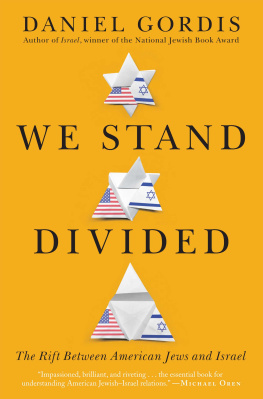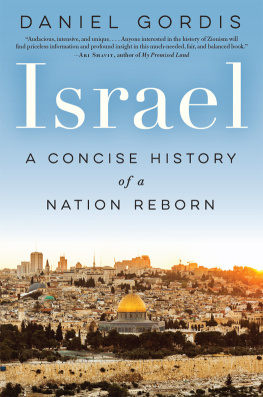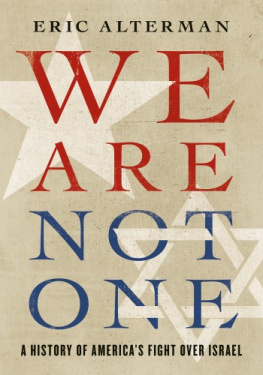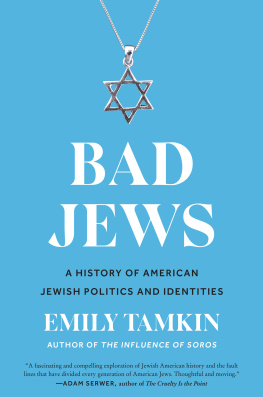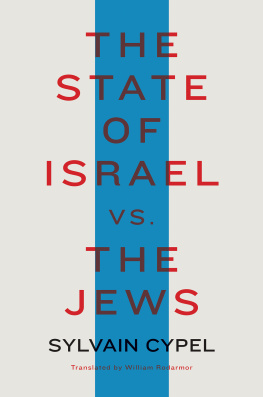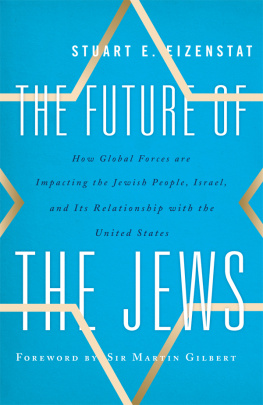S orry Israel, wrote a senior Israeli diplomat, but U.S. Jewry just isnt that into you.
His formulation hardly put matters subtly, but that was precisely the point. The goal was to awaken Israeli leaders, to alert them to a tectonic shift taking place in the relations between the worlds two largest Jewish communities. Even if the political echelons of both countries proclaimed unwavering loyalty to each other, the writer believed, at the communal level, a significant shift was under way. Both communities had long assumed that they shared an unbreakable bond, but any such assumption was overly optimistic. Not only were the bonds not unbreakable, but they had already started to crumble.
The newspaper column was written in 2017 by Alon Pinkas, an Israeli diplomat who had served as consul general of Israel in the United States and who, prior to that, was foreign policy adviser to Israeli prime minister Ehud Barak and chief of staff to several ministers of foreign affairs. Pinkas, in short, was as much of an insider as one could be in the world of Israeli foreign affairs. And he was determined to let his bosses and fellow Israeli citizens know that something dramatic had changed. The world they had assumed would last forever was already largely gonewith potentially dire implications for both communities.
Immediately following that arresting headline, however, came the following interesting subhead: The love affair lasted just three decades; but intractable conflict and intolerance for liberal Jews are deal-breakers. Contrary to what many people on both sides of the ocean had long believed, Pinkas was saying, not only had the relationship not been happily ever after, but it had not been love at first sight either. American Jews and Israel had had a passionate love affair, true, but it had been much shorter than many people had supposed. The love affair, in fact, had gone on for less than half of Israels life. The passionate bond between Israel and American Jews had already been nonexistent during long periods of Israels history, he said, and now another such period was beginning.
Pinkas had an explanation for the rocky relationship. The core problem, he said, lay with Israels policies and actions. Israels conflict with the Palestinians had American Jews utterly exasperated. Israels conflict with the Arab world was almost a century old. First Israel had been at war with neighboring nations, and then, once those wars ended, it became embroiled in a long conflict with the Palestinians. American Jews believed that peace simply had to be possible; after all, America had made peace with Germany, with Japan, with Vietnamthoughtful leaders could move their countries beyond conflict. Why couldnt Israel do that?
While one of the main causes of the breakup was Israels relationship with the Palestinians, another was Israels relationship with Diaspora Jews. Israels leadershipthe rabbinate and numerous politicianswere adopting a dismissive attitude toward non-Orthodox Judaism, resisting its influence in Israel and besmirching its impact in the Diaspora. With some 90 percent of American Jews defining themselves as non-Orthodox, that attitude was also killing the relationship.
Alon Pinkas was rightin some ways. Many American Jews, especially liberals, progressives, and millennials (overlapping categories in many cases), had indeed had enough of the conflict and were beyond offended at what Israeli leadership had to say about their Jewish way of life.
What Pinkas didnt mention, however, was that Israelis were just as exasperated with American Jews. In November 2017, Tzipi Hotovely, Israels deputy foreign minister, had been invited to speak at Hillel at Princeton University, but was then disinvited after pressure from a little-known progressive organization. Infuriated that Hillel had capitulated, Hotovely unleashed a diatribe about American Jews, explaining why they were so out of touch with Israelis. One factor, she said, was their not understanding the complexity of the region. She then went on to say essentially that American Jews lived rich, secure, and overly comfortable lives, entirely different from what Israelis experienced. People that never send their children to fight for their country, most of the Jews dont have children serving as soldiers, going to the Marines, going to Afghanistan, or to Iraq. Most of them are having quite convenient lives. They dont feel how it feels to be attacked by rockets, and I think part of it is to actually experience what Israel is dealing with on a daily basis.
It was hardly mellifluous English, but her point was clearand American Jews were enraged. Here was Israels deputy foreign minister essentially telling them that they didnt understand Israel, that they were too coddled to appreciate the challenges that Israelis regularly faced, and that they were essentially spoiled, overprotected, wealthy couch potatoes. Prime Minister Benjamin Netanyahu was forced to chastise Hotovely publicly. Yet when the Reform Movement in America demanded that Netanyahu fire her, he flatly refused. Prime ministers do not fire ministers for such minor missteps; Netanyahu also understood that, ill-chosen though her words may have been, in Israel there was a widespread sense of satisfaction that someone had finally called it like they saw it.
More measured writers and speakers made similar points. Attila Somfalvi, a Romanian-born Israeli journalist for Israels most popular news website, YNet, addressed American Jews when the subject of the rift arose, asking them: What have you done in recent years to fully understand Israeli society, or to present yourselves to Israel? Israel was foreign to American Jews because they had not invested any genuine effort in getting to know the real Israel. American Jews were also responsible for the rift.
WHY HAVE AMERICAN JEWS had it with Israelis? And why are Israelis no less put out with their American counterparts? What ails the relationship? Why cant we just get along? many have begun asking.
The purpose of this book is to trace and then to explain some of the more central causes of the complex, fraught, love-filled, hate-filled relationship that American Jews and Zionists (and then Israelis after 1948) have long had. When did the tensions begin, and why? What led to some periods of calm, even enthusiasm? Why does the relationship between the worlds two largest Jewish communities matter? And is there anything that can be done to address the current crisis?
There are, of course, important Jewish communities in many places throughout the world. One reason that this book looks specifically at the relationship between Jews in the United States and Israel, and not at others, is demographic. The American and Israeli Jewish communities total more than 85 percent of the Jewish world and are therefore likely to be the communities that determine the course of Jewish history. But there is a more substantive reason as well. As we will see, the complexity of Israels relationship with American Jews is due to distinct characteristics of American Judaism not shared by other Diaspora communities. The causes of the rift to which this book will point are not germane to other Diasporas, which have very different (and often less fraught) relationships with Zionism and Israel.
As we look at the story of the unique relationship between American Judaism and the Zionist movement, first in Europe and then in Israel, we will see that for most of the time since Theodor Herzl launched political Zionism at the First Zionist Congress in Basel, Switzerland, in 1897, the relationship between American Jews and Herzls idea, and then the country it created, has been complex at best and often even openly antagonistic. True, as Pinkas noted, an intense love affair did indeed begin around the time of the 1967 Six-Day War. Yet, as happens with many love affairs, it does not appear to be ending well. Furthermore, as is also the case in human relationships, warning signs of troubles ahead were in evidence from the outset. Tensions between American Jews and mainstream Zionism surfaced in the 1920s, long before there was a Jewish state. There was significant friction between Israels leaders and American Jewish leaders as Israel was created, long before anyone spoke about Palestinians, decades before American Jews had tired of the conflict, and many years before Israel assumed its dismissive attitude toward American Jewish life. The conflict between the two communities is almost as old as political Zionism itself.

